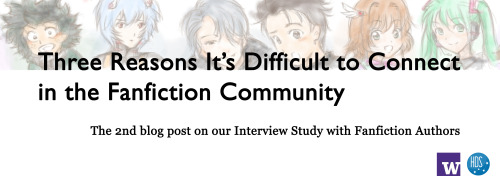Originally posted on August 26, 2019 at https://fanfictiondatascience.tumblr.com/post/187291063295/online-connection-changes-lives-authors-we.

Online connection changes lives. Authors we interviewed found support, feedback, friendship and even lifelong partnership from people they met online through fandom. People online can help authors develop their writing by providing feedback both in public spaces like AO3 and in private chat. But getting connected is not always easy. Several authors encountered difficulties with making new connections, turned away from their communities, or never connected much with others online at all. Feelings of social anxiety stopped people from reaching out, communities that didn’t feel like safe spaces turned people away, and a culture of fear towards internet strangers made others difficult to trust. In this post, we’ll describe the barriers that can make it difficult to connect in the fanfiction community.
Social Anxiety
Talking
to people is hard, and talking to people you can’t see on the other
side of the computer screen can be even harder. An experience shared by
many of our interviewees was a feeling of social anxiety. Social anxiety
is a fear of judgment from others that manifests in many ways, for
instance, the perception (without any particular evidence) that the
person you are considering reaching out to is not interested or
welcoming towards being contacted.
“I’m a shy person, so usually I may not [reach out]. I just say I feel embarrassed in speaking to people that seem cooler than me, more experienced… maybe I’m bothering them. Maybe they don’t see me as a friend, they have just been polite, this kind of thing” (P11).
Contacting
someone with a higher profile, such as a prolific author or fan
celebrity, amplified social anxiety. Interviewees held the perception
that these folks are likely overwhelmed with contact already and
therefore would be unwelcoming.
“I wouldn’t want to reach out to them because they’re on a different level than me in terms of popularity and probably get hundreds of messages all the time” (P18).
Authors who were reluctant to reach out oftentimes waited for others to contact them first. Or, instead of reaching out online, they relied on irl friends outside of the fandom for writing feedback. As a result of social anxiety, people don’t take that first step of reaching out to an online stranger, and therefore they don’t receive the benefits of a potential connection.
Unsafe Spaces
Writing and posting
fanfiction in a public space is, in a way, baring your soul to complete
strangers, and one sure way to stifle the soul-baring process was the
institution of discriminatory rules that disproportionately affected a
subset of the fan community. Restrictions on free expression created the
feeling of an unsafe space, and it is this feeling that drove authors
away from the community. During our interviews, authors discussed
situations where they left communities because they felt the space was
unsafe. The ban of NSFW content from Tumblr after its acquisition by
Verizon, widely viewed as an attack on sexual expression that
disproportionately affected queer people, was a recent example.
“When Tumblr banned not safe for work, it was really distressing for a bunch of us who don’t really fit on the very heteronormative sexual scale. So there was a lot of trying to figure out where we were going to go now, where we were, how would we stay connected, how would we continue to figure out and find stuff that we enjoyed” (P25).
Long-time
fandom authors told us of similar exoduses from LiveJournal and
Fanfiction.net after similar content bans and mass content deletions.
These actions by platform owners divided fan communities and forced
authors to find connections elsewhere.
In addition to institutional actions, individuals who made personal attacks or used hate speech also made authors feel unsafe. These antisocial actions happened in prominent fandom spaces.
“P27: There are people who write things that a fandom may consider controversial. This could cause them to get unhelpful criticism, rude and discouraging comments, so they will be constantly discouraged from writing.
Interviewer: That would happen on AO3?
P27: Both AO3 and tumblr, that’s where I know it happens.
Interviewer: And you’ve seen other people treated like that?
P27: Yes.” (P27).
One author spoke of an experience where she was berated for years by a reader because she wrote about drug addiction.
“Because [my fic is] about drug addiction, that brought a reaction that I really didn’t expect… sometimes [readers] impose their views. I got bullied for a couple of years, and even when I went on hiatus that person came back… they were imposing what they thought on me” (P7).
A
single bully discouraged and pushed away this writer, even as they
received an outpouring of messages from readers who connected with the
story.
Another author discussed how controversy over a gay character sent them elsewhere:
“At the time I was writing about neon genesis evangelion. And it turns out at the end of the show, the main character Shinji Ikari is gay. Well, it’s revealed he has a thing for this guy. And I was writing this kind of thing too, and people got super angry. So they’d leave because, oh my God, he’s gay and that was terrible at the time. So, uh, yeah, I quickly left” (P8).
Fanfiction authors tackle difficult, important and controversial topics, and they need a space where they can find others to relate to without fear of harassment. If personal attacks, hate speech, or discriminatory rules are present, they may feel they can’t stay connected and will be forced to go elsewhere.
Personal Disclosure
Navigating
personal disclosure can be difficult for authors when they’re
interacting with internet strangers. Although authors disclosed deeply
personal facts about themselves through fanfiction writing itself, some
preferred to avoid connecting their fanfiction identity to their offline
identity. Others wanted to protect themselves and their families from
potential exposure on the internet. Identity and safety concerns
associated with online personal disclosure slowed relationship building
between authors and online friends.
Is this faceless
individual actually a murderer, merely feigning deep interest in Star
Trek and waiting for an opportunity to strike at unsuspecting fans?
Being
raised to fear internet strangers was a shared experience among several
participants in our interviews. Authors chose different degrees of
disclosure they were comfortable with, and made nuanced decisions about
who to reveal information about themselves to, where and when.
“There’s not any set guidelines. I think it really depends on who you talk to… how long have you been with the person? What type of things do you talk about? Do you feel like it’s safe to give that information?” (P21).
Oftentimes,
the decision of whether to reveal a piece of identifying information
had to be on-the-spot. P21 had to decide whether this person who wanted
to be co-author was someone who could be trusted.
“… You kind of have to sometimes make a snap judgment and ultimately it worked out fine in this one case… it really does have to come down to instinct, gut, sometimes, there’s no kind of set formula to be sure” (P21).
Personal disclosure and relationship-building go hand-in-hand. But In an environment where personal disclosure requires caution and nuance, building connection and relationships becomes much more difficult.
To Be Continued…
There
are powerful isolating elements like social anxiety, unsafe spaces and
stranger danger keeping fanfiction authors apart. How do authors
overcome these barriers to make connections, build relationships,
exchange feedback and change lives? Stay tuned for the next part of our
series on connection and feedback in fanfiction communities.
About This Series
This series is a breakdown of findings from an interview study run by a fanfiction research group within the department of Human Centered Design & Engineering at University of Washington. In January and February 2019, we interviewed 29 fanfiction authors to understand how they connect with each other, build relationships, and seek out writing feedback. We learned profound lessons about the importance of building connections, the reciprocality of relationships and feedback, and the intersection of fandom with real life identity.


